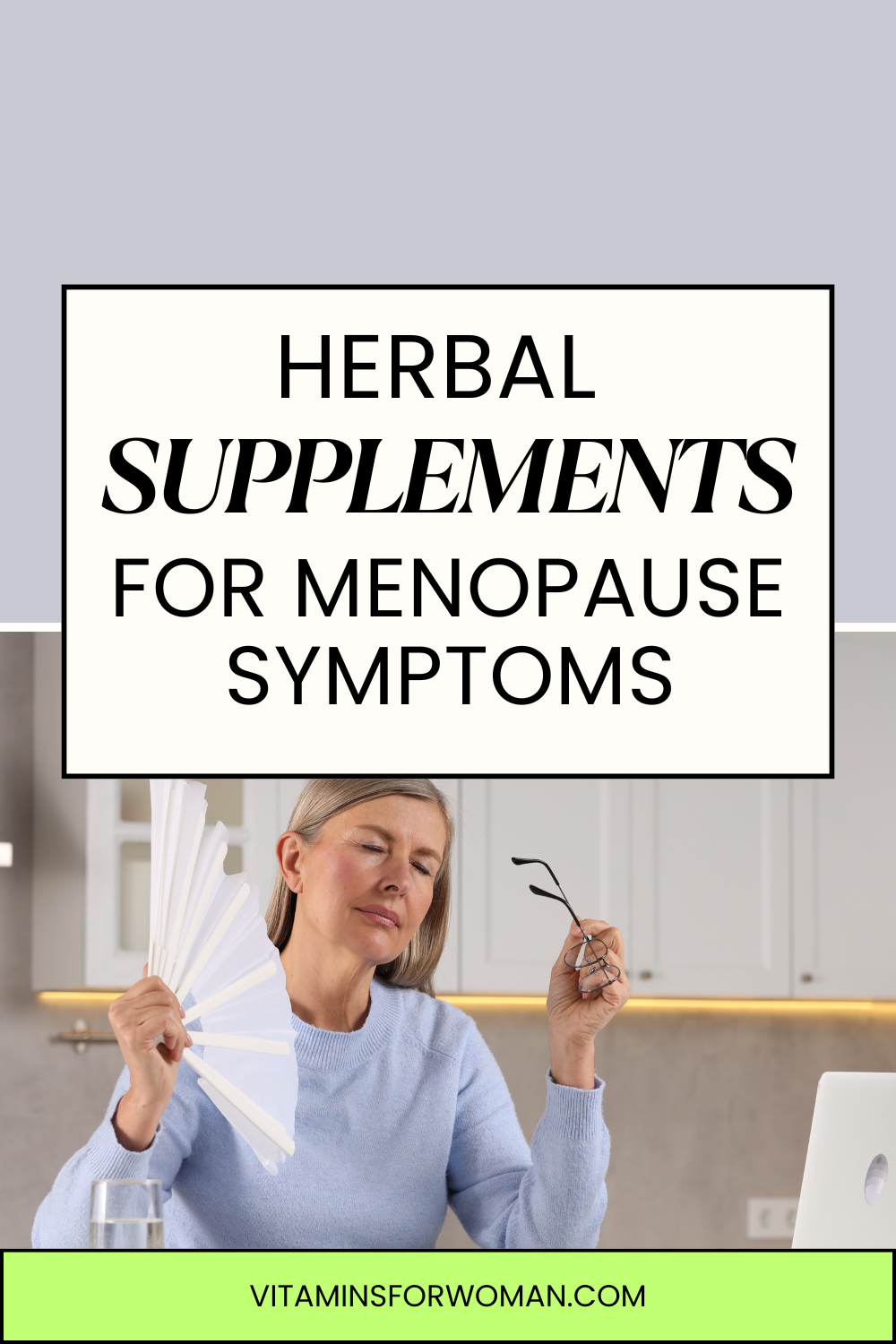Herbal supplements for menopause symptoms are becoming increasingly popular as women look for natural alternatives to ease hot flashes, night sweats, mood swings, and sleep problems. But which herbs actually help, and what does the science say?
Introduction
Herbal supplements for menopause symptoms are often marketed as natural solutions for the discomforts of perimenopause and menopause. While some women find relief from herbs like black cohosh or red clover, others may not notice much change.
Understanding which supplements have evidence behind them—and which are more hype than help—is essential. In this article, we’ll explore the most researched herbal options, how they may work, and what realistic expectations women should have.
Black Cohosh: Relief for Hot Flashes?
Black cohosh is one of the most commonly used herbs for menopause. Research suggests it may help reduce the frequency and intensity of hot flashes and night sweats, though results are mixed. Some studies report significant improvement, while others show no benefit. Safety concerns are minimal for short-term use, though long-term effects remain unclear. Here’s a Black cohosh supplement for hot flash support on Amazon.
Red Clover: Plant-Based Estrogen Support
Red clover contains isoflavones, plant compounds with estrogen-like activity. For some women, these phytoestrogens may help ease hot flashes and support bone health. However, clinical results are inconsistent. Women with a history of hormone-sensitive cancers should consult a healthcare provider before using red clover. Still, many find it a gentle option for managing mild symptoms.
Ashwagandha: Stress and Sleep Support
Ashwagandha, an adaptogenic herb, is known for its ability to reduce stress and improve sleep quality. While it does not directly target hot flashes, many women in perimenopause struggle with heightened stress and insomnia. Ashwagandha may improve resilience to stress, stabilize mood, and support better rest, making it a valuable ally during midlife transitions. Check these Ashwagandha capsules for stress relief.
Dong Quai: Traditional but Inconsistent
Dong quai has a long history in traditional Chinese medicine for supporting women’s health. It is sometimes referred to as “female ginseng.” However, research findings on its effectiveness for menopause symptoms are inconsistent. Some studies suggest benefits for circulation and menstrual balance, while others show no significant impact on hot flashes or mood swings. Safety can also be a concern, especially for women on blood thinners.
Evening Primrose Oil: Popular but Limited Evidence
Evening primrose oil is often promoted for hot flashes and breast tenderness, but evidence supporting its use is weak. Some women report relief, but clinical trials have not consistently confirmed its effectiveness. That said, it remains a popular choice, particularly among women looking for natural oils to support hormonal balance. You can check out Omnibiotics Organic Evening Primrose Supplement here.
Sage: Cooling for Hot Flashes
Sage extract has been studied for its effects on excessive sweating and hot flashes. Results show promise, with some women experiencing fewer and less intense symptoms. As a culinary and medicinal herb, sage is generally well tolerated and may be a safe, natural option for symptom management.
Frequently Asked Questions
1. Do herbal supplements really work for menopause symptoms?
Some do. Herbs like black cohosh and sage show promise, but results vary. They may ease symptoms for some women while offering little change for others.
2. Are herbal supplements safer than hormone therapy?
Not necessarily. While generally considered safe, herbs can interact with medications or health conditions. Always consult a healthcare provider before starting supplements.
3. Which herbal supplement is best for sleep and mood during menopause?
Ashwagandha stands out for reducing stress and improving sleep, making it a strong choice for women whose main struggles are anxiety and insomnia.
A Word From Vitamins For Woman
Herbal supplements for menopause symptoms can offer gentle support, but they are not a one-size-fits-all solution. Every woman’s experience with menopause is unique, and what works for one may not work for another. Consider herbs as part of a broader strategy—alongside good nutrition, stress management, and medical guidance—to navigate midlife with more ease and confidence.
References
- Shams T, Setia MS, Hemmings R, et al. Efficacy of black cohosh-containing preparations on menopausal symptoms: A meta-analysis. Menopause. 2010;17(4):844-852.
- Tice JA, Ettinger B, Ensrud K, et al. Phytoestrogen supplements for the treatment of hot flashes: The isoflavone clover extract study. JAMA. 2003;290(2):207-214.
- Chandrasekhar K, Kapoor J, Anishetty S. A prospective, randomized double-blind, placebo-controlled study of safety and efficacy of ashwagandha root in reducing stress and anxiety. Indian J Psychol Med. 2012;34(3):255-262.
- Low Dog T. Menopause: A review of botanical dietary supplements. Am J Med. 2005;118(12 Suppl 2):98-108.
- Bommer S, Klein P, Suter A, et al. First-time proof of sage’s tolerability and efficacy in menopausal women with hot flushes. Adv Ther. 2011;28(6):490-500.






